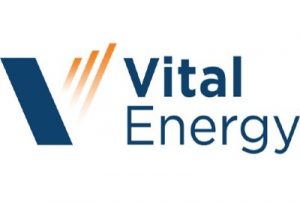
Tulsa’s Vital Energy says it anticipates running four drilling rigs and one to two completions crews throughout the remainder of its 2024 exploration efforts in the Permian Basin.
In an annual report filed with the U.S. Securities and Exchange Commission, the company said it might adjust the drilling rig count and completions crews to maximize efficiencies and cash flow.
The company made it clear in the report that its only exploration and production efforts are in the Permian Basin where it is focusing development activities in the Wolfcamp, Spraberry and Bone Spring formations.
“All but 100 of our wells are classified as oil wells, all of which also produce liquids-rich natural gas and condensate when in a producing status,” according to the SEC filing. At the end of 2023, Vital had an average working interest of 72% in Vital-operated active produtive wells and 66% in all wells in which Vital had an interest.
A final investment decision has been made on all 212 proved undeveloped locations, and they are scheduled to be developed within five years from the date they were initially recorded.
Estimated total future development and abandonment costs related to the development of proved undeveloped reserves as shown in our December 31, 2023 reserve report are $1.7 billion.
The capital estimated to be spent to develop the proved undeveloped reserves from spud date through production is $566.8 million in 2024, $335.4 million in 2025, $398.3 million in 2026, $271.3 million in 2027 and $83.6 million in 2028. The company anticipates drilling and completion of all of the proved undeveloped locations by 2028.

Vital’s annual report also cautioned investors that regulatory actions by the Biden administration, the state of Texas and local government agencies could affect its bottom line and its exploratory efforts. Hydaulic fracturing could be restricted in some areas and moves by the Texas Railroad Commission in response to earthquakes could also affect the company.
The region where Vital’s drilling is focused has seen increased scrutiny over the use of injection wells which were determined to have played a role in increased seismic activity. Vital pointed out how the RRC has issued rules that, among other things, require applicants for new disposal wells that will receive non-hazardous produced water and hydraulic fracturing flowback fluid to conduct seismic activity searches utilizing the U.S. Geological Survey.
The RRC has used this authority to deny permits and temporarily suspend operations for waste disposal wells and, in September 2021, the RRC curtailed the amount of water companies were permitted to inject into some wells near Midland and Odessa in the Permian Basin and has since indefinitely suspended some permits there and expanded the restrictions to other areas.
More recently, in December 2023, the RRC suspended the permits of 23 deep disposal wells in the seismic response area covering Culberson and Reeves Counties. These restrictions on the disposal of produced water could result in increased operating costs, forcing us or our service providers to truck produced water, recycle it or pump it through the pipeline network or other means, all of which could be costly.




